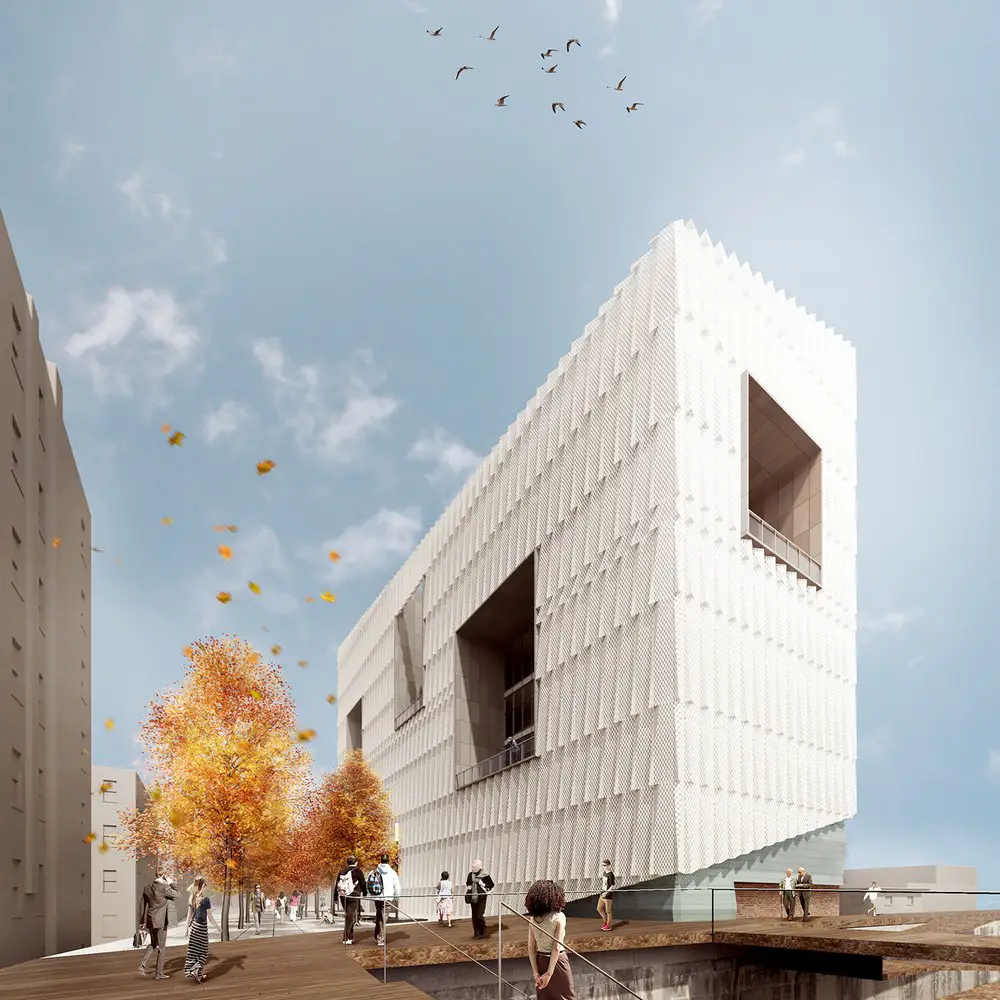Mark Pasnik Architect, OUT100 list 2020, Boston Architecture, Massachusetts Architectural News, Design
Mark Pasnik Architect News
Nov 27 & 23, 2020
We are delighted to share the news that architect, author and activist, Mark Pasnik, a Founding Principal at OverUnder, Chair of the Boston Art Commission and a Professor at Wentworth Institute of Technology is one of the honorees on this year’s OUT100 list as compiled by OUT magazine.
Mark Pasnik, OverUnder, in OUT100 list
Mark is the only honoree that is an Architect and his role in raising the profile of Boston’s significant architecture and advocating for a re-examination of the city’s historic statues is a focus of the citation.
Weitzman Museum and Cultural Center, Haverhill, Massachusetts, USA
– Feasibility study for new cultural center and museum that will have renowned shoe designer Stuart Weitzman’s collection at its heart:
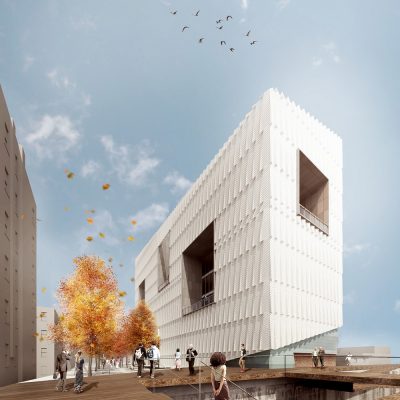
Rendering courtesy OverUnder
Mark is honored for his career work as a champion of “unpopular battles” which is at the core of OverUnder, the architecture design firm rooted in advocacy which he co-founded in 2006. OUT cites Mark as an expert and published author on brutalism, of which Boston City Hall is one of the most widely recognized examples. With Michael Kubo and Chris Grimley, Mark is the author of Heroic: Concrete Architecture and the New Boston, which broke ground in the scholarly assessment of concrete buildings.
Mark Pasnik, photographed for OUT magazine inside Boston City Hall, the iconic example of Brutalist architecture featured in the book Pasnik co-author, “Heroic: Concrete Architecture and the New Boston”:
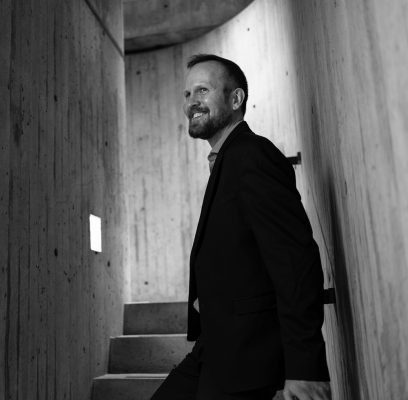
photograph © Sam Rosenholtz Photography
OUT also cites Mark’s role as Chair of the Boston Art Commission, where he has been reminded of the “value of meaningful public discourse in communicating across divides.”
“Every year, OUT magazine’s 100 most influential LGBTQ+ people of the year is filled with politicians, entertainers, athletes, and activists who’ve become household names,” explains Diane Anderson-Minshall, CEO & Editorial Director of Pride Media.
“Each time there are honorees who aren’t so well known, but who have moved their world, field, or community in ways equally deserving of recognition. Mark Pasnik is one of those gems, a champion who has influenced our understanding of brutalist architecture as well as public monuments. His thought leadership and public action have touched many across the country, rippling outward through the ways his design firm OverUnder advocates for small cities that face real challenges and fights to preserve the legacies of earlier generations seen in buildings like Boston City Hall.”
The 26th annual OUT100 list is a collection of LGTBQ+ trail blazers, artists, leaders, and creators who have used their talent and voices to influence change and visibility in the last year.
I’ve included the text of the citation below and a link to the entire list of diverse, international honorees which includes François Arnaud, Tim Cook, Wilson Cruz, Karine Jean-Pierre, Rachel Maddow, Janelle Monáe, Queen Jean, Quinn, Ritchie Torres, Mary Trump, and Scott Wiener among others.
Heroic: Concrete Architecture and the New Boston:
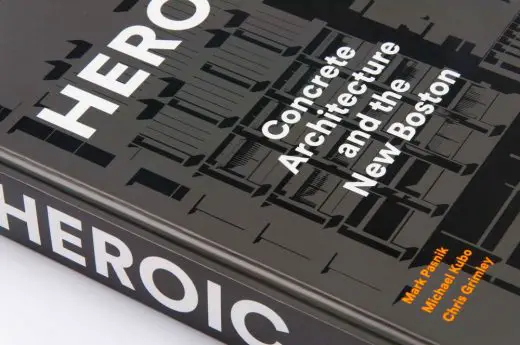
photo courtesy The Monacelli Press
Mark Pasnik, Architect and Activist
When asked to describe himself, Mark Pasnik is humble. “I like to think of myself as having several interconnected roles — as an architect, educator, and advocate who champions the voices and legacy of other eras.”
In truth, Pasnik, who is gay, is also an expert and published author on brutalism, the “legacy of concrete modernist buildings,” as he defines the term. He cites Boston’s City Hall as “one of the most widely recognized” examples of the type of now-vilified structures “once celebrated for their bravado.” In his role as chair of the Boston Art Commission, Pasnik has been reminded of the “value of meaningful public discourse in communicating across divides.”
Earlier this year, the commission unanimously voted to remove the Emancipation Memorial in Park Square that depicted a freed American Black slave kneeling before Abraham Lincoln. He and others have implemented such discourse to address larger issues facing an increasingly polarized society suffering the effects of systemic oppression, which are often represented in historic statues that are out of step with today’s ethos. “I have been learning from many voices in Boston’s communities about symbolism and racial justice in public art,” he says.
Despite the current cultural divide, Pasnik remains hopeful for the future and the positive impact architecture can have in effecting change. “Architecture is a particularly fascinating art form because it records ideas from one era and transmits them across decades. Advocating for works of architecture means understanding those messages and sharing their lessons with new generations.” (https://overunder.co/)
https://www.out.com/print/2020/11/19/see-he-full-2020-out100-list-here#media-gallery-media-16
Mark Pasnik Architect
February 19, 2018
Mark Pasnik, AIA
Founding Principal, OverUnder
Boston, MA
Mark Pasnik is an architect, author, and professor who co-founded OverUnder, a multidisciplinary practice engaged in architecture and design projects ranging from books to city design in the United States and abroad. His renown has centered on the challenge of preserving and rethinking concrete buildings from the modern era, most recently heading the firm’s work on a Getty Foundation-funded conservation management plan for Boston City Hall. He has been an activist in the effort to preserve the Government Service Center in downtown Boston, a building by the preeminent modernist Paul Rudolph, who was a gay man.
Not afraid to take on an unpopular battle, Mark is the “concrete guy” and this is the thread that connects his studies at Cornell and Harvard, his work as an architect and designer, his influence as a university professor and scholar, and his contributions to preservation.
Weitzman Museum and Cultural Center, Haverhill, Massachusetts, USA
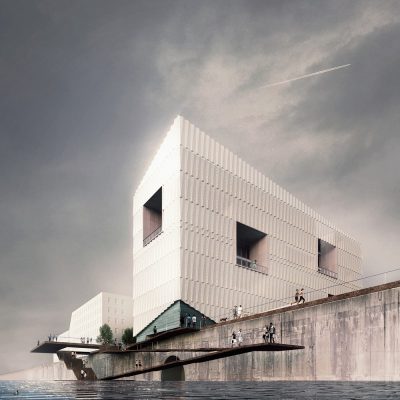
Rendering courtesy OverUnder
Concrete modernism—often labeled with the term Brutalism—represents perhaps the single most controversial movement in architecture. Its monumentality and bravado are characteristics that may be considered either inspiring or dehumanizing. Yet Pasnik has helped bring a new appreciation to these misunderstood buildings. As a consequence, many that were once vilified are now gaining new appreciation.
With Michael Kubo and Chris Grimley, Mark is the author of Heroic: Concrete Architecture and the New Boston (Monacelli Press, 2015), which broke ground in the scholarly assessment of concrete buildings, receiving awards from Docomomo US, Historic New England, the Boston Society of Architects, and the Boston Preservation Alliance. An outcome of the popularity of the book is that the title term—Heroic—is being widely used as a new name for Brutalism, one that better reflects the original civic-minded aspirations behind the works.
ArtFarm, Somerville, Massachusetts, USA:
– Working closely with the City of Somerville and the Somerville Arts Council, OverUnder is leading the design of a community space for the arts and urban agriculture:
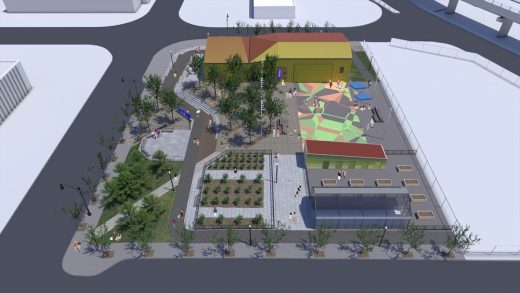
Rendering courtesy OverUnder
Pasnik is also known for providing a renewed voice to the seminal men and women of the era through his research and publications, including two towering figures who passed away recently, Henry N. Cobb and N. Michael McKinnell.
Cobb was known for his skyscrapers around the globe, including Boston’s Hancock, and as a founder of New York’s Pei Cobb Freed & Partners. He died at 93 on March 2, shortly after Pasnik edited Cobb’s only book (Henry N. Cobb: Words & Works 1948-2018).
McKinnell, who won the competition for Boston City Hall at age 26, passed away from COVID-related causes at 84 on March 27. Pasnik worked closely with McKinnell to preserve his legacy of ideas and buildings.
Looking to the future, Pasnik has been leading studios at Wentworth Institute of Technology with dozens of aspiring architecture and design students, aiming to reimagine the future of important, yet often troubled, concrete buildings. His efforts have influenced civic conversations about preservation around structures like Rudolph’s Government Service Center (Rudolph passed away in 1997), which is currently in danger of partial demolition.
In 2019 Pasnik started a new initiative in conjunction with the city’s mayor’s office, where architecture students at Wentworth engage with high school students from Boston Public Schools to evaluate and reimagine a concrete building by Marcel Breuer in the Roxbury neighborhood.
Mark has taught at the California College of the Arts, Carnegie Mellon University, Northeastern University, Rhode Island School of Design, and Wentworth Institute of Technology, where he is currently a professor. He received the American Institute of Architects Young Architects Award and was a member of the executive board of Boston Society of Architects.
Pasnik currently serves as chair of the Boston Art Commission. In this role he has been an advocate for social justice in public art, most recently overseeing the public process that led to a unanimous vote to remove and recontextualize the Emancipation Group in Boston. The statue, showing Lincoln with his arm raised over a kneeling Black man, had been criticized for decades as a misrepresentation of history and a demeaning portrayal of the formerly enslaved figure, Archer Alexander. The vote on June 30 culminated two years of work and a series of public hearings. At a time when many controversial sculptures are being removed through illegal action, Boston’s process stands as a national model for deliberation and meaningful public discourse.
Pasnik and his life partner of twenty years, David Smith, reside in Boston and New York respectively.
Mark Pasnik Architect OverUnder image / information received 231120
Address: Boston, MA, United States
Boston Architecture Practices
Boston Architects Offices – Selection
Elkus Manfredi Architects
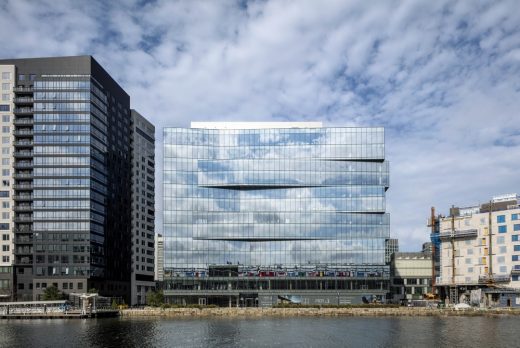
photograph © Magda Biernat
Elkus Manfredi Architects
MASS Design Group
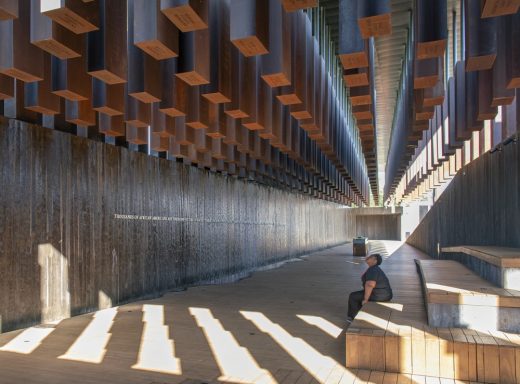
image © MASS Design Group
MASS Design Group
Kennedy & Violich Architecture
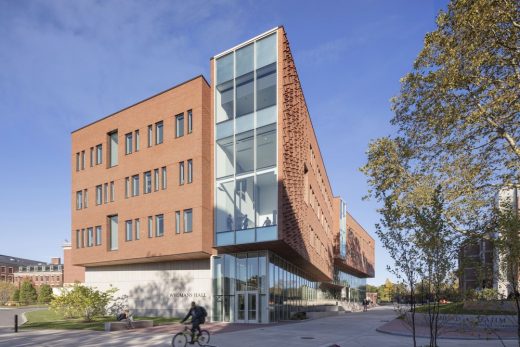
photograph by John Horner
Kennedy & Violich Architecture: KVA Boston
Boston Architecture Designs – chronological list
US Architecture
Center for Architecture in New York Events, NYC
UB School of Architecture & Planning Buffalo Event, NY
Comments / photos for the Mark Pasnik Architect, OverUnder Boston page welcome

